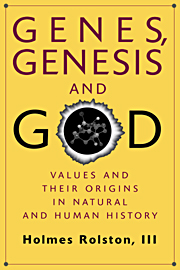Book contents
- Frontmatter
- Contents
- Preface
- Chapter 1 Genetic Values: Diversity and Complexity in Natural History
- Chapter 2 Genetic Identity: Conserved and Integrated Values
- Chapter 3 Culture: Genes and the Genesis of Human Culture
- Chapter 4 Science: Naturalized, Socialized, Evaluated
- Chapter 5 Ethics: Naturalized, Socialized, Evaluated
- Chapter 6 Religion: Naturalized, Socialized, Evaluated
- References
- Index
Chapter 4 - Science: Naturalized, Socialized, Evaluated
Published online by Cambridge University Press: 05 June 2012
- Frontmatter
- Contents
- Preface
- Chapter 1 Genetic Values: Diversity and Complexity in Natural History
- Chapter 2 Genetic Identity: Conserved and Integrated Values
- Chapter 3 Culture: Genes and the Genesis of Human Culture
- Chapter 4 Science: Naturalized, Socialized, Evaluated
- Chapter 5 Ethics: Naturalized, Socialized, Evaluated
- Chapter 6 Religion: Naturalized, Socialized, Evaluated
- References
- Index
Summary
On the path we next travel, we explore three principal fields of achievement in cultural history, events on a storied Earth with its plural histories, which began with the achievements in evolutionary natural history. In any philosophical overview of both the natural and the cultural landscapes, one must take account of the genesis of science, ethics, and religion, for all three are undeniably now present on Earth in considerable force. One must explain the remarkable creativity with which humans find themselves surrounded, but this creativity also reaches within to include our own human activities. Up to this point, genetic creativity has been our focus, but this may be only one kind; cultural creativity may be another, including its scientific, ethical, and religious forms.
Evidence of such scientific creativity is immediately at hand in the genius (Darwin, Mendel, Watson and Crick) that has discovered genetic creativity. After all, the place we learn about genes and their genesis is science. Persons at all times and places can look around them and see that something has been somehow created; they can puzzle and speculate about this. But only with the genius of science do humans learn of the remarkable genesis that has taken place in evolutionary natural history. Two things now need to be fitted into a comprehensive worldview: such natural history generated, and the human mind, generated out of such natural history, with the capacity to generate science: to look over, understand, and evaluate such events.
- Type
- Chapter
- Information
- Genes, Genesis, and GodValues and their Origins in Natural and Human History, pp. 160 - 211Publisher: Cambridge University PressPrint publication year: 1999



